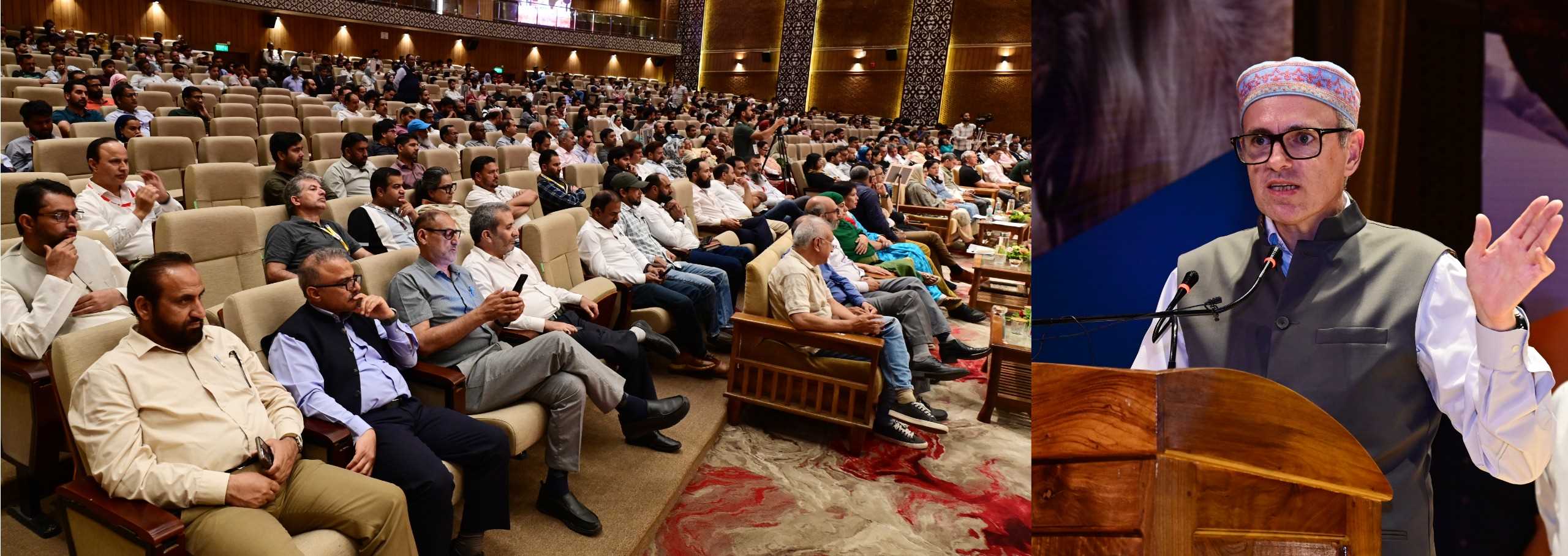
Chief Minister Omar Abdullah On Friday pledged that his government will act promptly on the recommendations of the Second International Conference on Hangul protection and other threatened Ungulates conservation (2IHUC-25), so that measurable progress is achieved in the population of Hangul and Markhor before the next such conference is held.
The Chief Minister, who is also Pro-Chancellor of Sher-e-Kashmir University of Agricultural Sciences and Technology of Kashmir (SKUAST-K), was speaking at the valedictory session of the three-day international conference at SKUAST-K’s Shalimar campus.
Addressing a distinguished gathering of conservation experts, scientists, policymakers, and delegates from India and abroad, Omar assured that J&K government would treat the outcomes of the conference with utmost seriousness.
“On behalf of my colleagues in government, I assure you that the recommendations emerging from this conference will be implemented at the earliest. My hope is that when we meet here next time, the population of Hangul and Markhor will have grown significantly,” he said.
Recalling the words of eminent conservationist MK Ranjitsinh, he stressed that conservation is deeply tied to human well-being.
“Conservation is not only about animals—it is about human survival itself. Protecting Hangul, Markhor, or any threatened species is essentially about protecting life and the delicate ecological balance we depend upon,” he said.
Sharing his personal regret, Omar noted that despite living close to Dachigam National Park, he had never seen a Hangul with a naked eye.
“I don’t want a situation where our children and grandchildren know these species only through photographs in books, like the dodo or woolly mammoth. That would be a tragedy we must not allow,” he warned.
The CM underlined the need for synergy between academic institutions and government agencies to ensure practical outcomes.
“Unless there is synergy between academic research and government implementation, we risk losing magnificent animals like the Hangul. Every species exists for a reason. When they thrive, ecosystems thrive—and when ecosystems thrive, humankind thrives as well,” he said.
Cautioning against complacency, he said that these species will not wait for files to move from one department to another. “We cannot afford bureaucratic delays. The findings of this conference must translate into action with urgency”.
The CM thanked international and national delegates for their participation and expressed hope that such conferences would be held more frequently.
The three-day event brought together more than 200 delegates, including eminent wildlife experts, conservationists, and biologists from the United States, United Kingdom, Canada, the Middle East, Central Asia, and South Asia. Participants shared research and strategies for conserving Hangul, Markhor, and other threatened ungulates of the Himalayan region.
On the occasion, the CM released a Vision Document titled ‘Institute of Mountain Wildlife Sciences’ and distributed awards and appreciation certificates to participants.
Others who addressed the gathering included Forest Minister Javed Ahmed Rana, Advisor to CM Nasir Aslam Wani, Vice Chancellor SKUAST-Kashmir Prof. Nazir A. Ganie, Principal Chief Conservator of Forests Suresh Gupta and international expert Dr. Gonzalez.
Chief Minister Omar Abdullah On Friday pledged that his government will act promptly on the recommendations of the Second International Conference on Hangul protection and other threatened Ungulates conservation (2IHUC-25), so that measurable progress is achieved in the population of Hangul and Markhor before the next such conference is held.
The Chief Minister, who is also Pro-Chancellor of Sher-e-Kashmir University of Agricultural Sciences and Technology of Kashmir (SKUAST-K), was speaking at the valedictory session of the three-day international conference at SKUAST-K’s Shalimar campus.
Addressing a distinguished gathering of conservation experts, scientists, policymakers, and delegates from India and abroad, Omar assured that J&K government would treat the outcomes of the conference with utmost seriousness.
“On behalf of my colleagues in government, I assure you that the recommendations emerging from this conference will be implemented at the earliest. My hope is that when we meet here next time, the population of Hangul and Markhor will have grown significantly,” he said.
Recalling the words of eminent conservationist MK Ranjitsinh, he stressed that conservation is deeply tied to human well-being.
“Conservation is not only about animals—it is about human survival itself. Protecting Hangul, Markhor, or any threatened species is essentially about protecting life and the delicate ecological balance we depend upon,” he said.
Sharing his personal regret, Omar noted that despite living close to Dachigam National Park, he had never seen a Hangul with a naked eye.
“I don’t want a situation where our children and grandchildren know these species only through photographs in books, like the dodo or woolly mammoth. That would be a tragedy we must not allow,” he warned.
The CM underlined the need for synergy between academic institutions and government agencies to ensure practical outcomes.
“Unless there is synergy between academic research and government implementation, we risk losing magnificent animals like the Hangul. Every species exists for a reason. When they thrive, ecosystems thrive—and when ecosystems thrive, humankind thrives as well,” he said.
Cautioning against complacency, he said that these species will not wait for files to move from one department to another. “We cannot afford bureaucratic delays. The findings of this conference must translate into action with urgency”.
The CM thanked international and national delegates for their participation and expressed hope that such conferences would be held more frequently.
The three-day event brought together more than 200 delegates, including eminent wildlife experts, conservationists, and biologists from the United States, United Kingdom, Canada, the Middle East, Central Asia, and South Asia. Participants shared research and strategies for conserving Hangul, Markhor, and other threatened ungulates of the Himalayan region.
On the occasion, the CM released a Vision Document titled ‘Institute of Mountain Wildlife Sciences’ and distributed awards and appreciation certificates to participants.
Others who addressed the gathering included Forest Minister Javed Ahmed Rana, Advisor to CM Nasir Aslam Wani, Vice Chancellor SKUAST-Kashmir Prof. Nazir A. Ganie, Principal Chief Conservator of Forests Suresh Gupta and international expert Dr. Gonzalez.
© Copyright 2023 brighterkashmir.com All Rights Reserved. Quantum Technologies